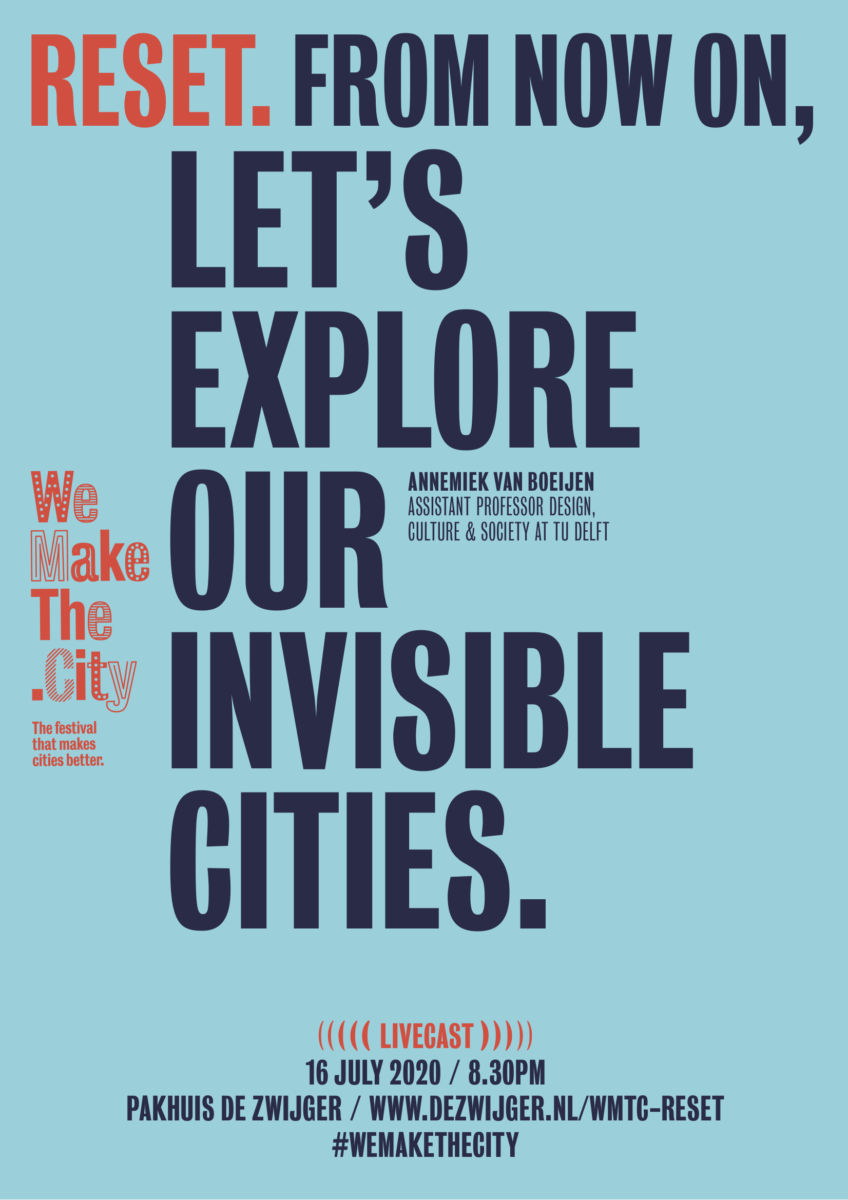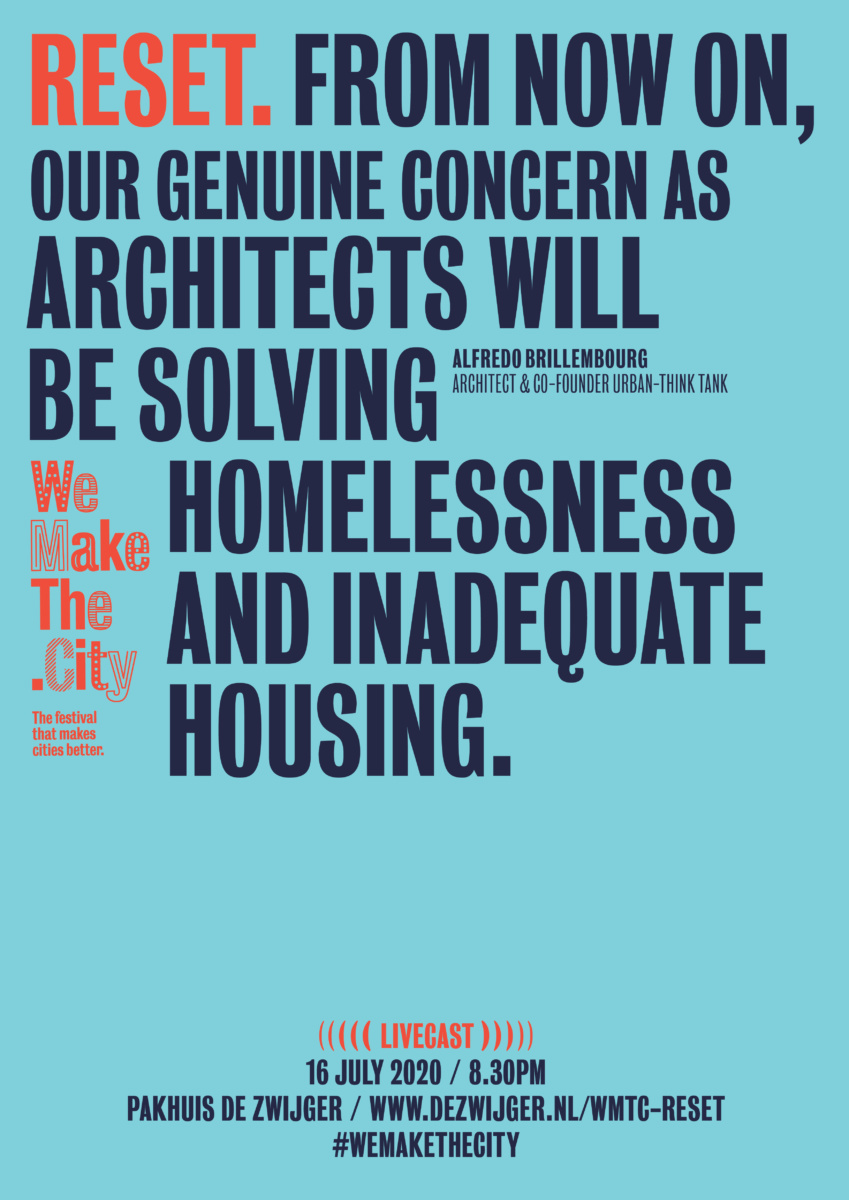In the last couple of months, our streets were empty and our cities quiet. Behind this seeming tranquility, there has been a storm raging through our values and structures. It has given us the space to think about a complete ‘reset’ of the dysfunctional systems in our society. In this series, we showcase the perspectives of a variety of thought leaders who will reflect on our present-day situation. Through the lens of their area of expertise and with an emphasis on the power of design and imagination. The corona crisis is, without a doubt, a crisis that is leaving behind a trail of victims. But which transformations will we be left within the aftermath? In times as these, it is the creatives, philosophers, scientists, makers, and designers who can visualise new scenarios, and develop new insights for our future.
About Annemiek van Boeijen
 Annemiek van Boeijen is full-time Assistant Professor Industrial Design at the faculty of Industrial Design Engineering at the Delft University of Technology. After she graduated as an industrial designer in 1990, she got involved in international development projects. In 2015 she defended her thesis Crossing Cultural Chasms – towards a culture-conscious approach to design. Currently, her research is focused on the role of culture in design processes, with the goal of designing methods geared to support designers in cultivating a culture-conscious approach. She is the initiator and co-editor of the Delft Design Guide, and recently published the book Culture Sensitive Design: A Guide to Culture in Practice that she wrote together with Yvo Zijlstra, founder and designer of Antenna-Men. Culture is a complex phenomenon defined by an ongoing process of shifts in human interactions and experiences. In addition to the functional, technical, and economic requirements, it is primarily culture that defines how any designed object and service will perform and prove itself: a process that largely takes place outside the domain and control of the designer. How do we get in touch with different cultural values, customs, and symbols to design futureproof products and systems?
Annemiek van Boeijen is full-time Assistant Professor Industrial Design at the faculty of Industrial Design Engineering at the Delft University of Technology. After she graduated as an industrial designer in 1990, she got involved in international development projects. In 2015 she defended her thesis Crossing Cultural Chasms – towards a culture-conscious approach to design. Currently, her research is focused on the role of culture in design processes, with the goal of designing methods geared to support designers in cultivating a culture-conscious approach. She is the initiator and co-editor of the Delft Design Guide, and recently published the book Culture Sensitive Design: A Guide to Culture in Practice that she wrote together with Yvo Zijlstra, founder and designer of Antenna-Men. Culture is a complex phenomenon defined by an ongoing process of shifts in human interactions and experiences. In addition to the functional, technical, and economic requirements, it is primarily culture that defines how any designed object and service will perform and prove itself: a process that largely takes place outside the domain and control of the designer. How do we get in touch with different cultural values, customs, and symbols to design futureproof products and systems?
About Alfredo Brillembourg
 Architect Alfredo Brillembourg received his Master of Science in Architectural Design in 1986 from Columbia University and a second architecture degree from the Central University of Venezuela in 1992. In 1998, he and Hubert Klumpner founded Urban-Think Tank (U-TT) in Caracas, Venezuela, an interdisciplinary design practice dedicated to high-level research and design on a variety of subjects, concerned with contemporary architecture and urbanism. The philosophy of U-TT is to deliver innovative yet practical solutions through the combined skills of architects, civil engineers, environmental planners, landscape architects, and communication specialists. Notable projects include the Caracas Metrocable, the Vertical Gym typology, and the documentary and publication on Torre David – a 45-storey unfinished office tower in Caracas that has become a node for the study of informal vertical communities. Alfredo believes architecture and urban planning cannot be either top-down or bottom-up but need a deep and lengthy immersion in the culture and lives of the locals. Designers often struggle to know what solution is appropriate and genuinely useful. From 16 – 29 October 2020, Alfredo will host a two-week studio at the Independent School for the City in Rotterdam, exploring new development strategies for collective affordable housing.
Architect Alfredo Brillembourg received his Master of Science in Architectural Design in 1986 from Columbia University and a second architecture degree from the Central University of Venezuela in 1992. In 1998, he and Hubert Klumpner founded Urban-Think Tank (U-TT) in Caracas, Venezuela, an interdisciplinary design practice dedicated to high-level research and design on a variety of subjects, concerned with contemporary architecture and urbanism. The philosophy of U-TT is to deliver innovative yet practical solutions through the combined skills of architects, civil engineers, environmental planners, landscape architects, and communication specialists. Notable projects include the Caracas Metrocable, the Vertical Gym typology, and the documentary and publication on Torre David – a 45-storey unfinished office tower in Caracas that has become a node for the study of informal vertical communities. Alfredo believes architecture and urban planning cannot be either top-down or bottom-up but need a deep and lengthy immersion in the culture and lives of the locals. Designers often struggle to know what solution is appropriate and genuinely useful. From 16 – 29 October 2020, Alfredo will host a two-week studio at the Independent School for the City in Rotterdam, exploring new development strategies for collective affordable housing.

BIS Publishers - Societies worldwide are increasingly interconnected through trade, migration, education and digitisation. This has resulted in a profound new complexity of cultural groups. Consequently, designers are confronted with the challenge of gaining a clear understanding of this cultural diversity. >>

Design Digger - TU-onderzoeker Annemiek van Boeijen kijkt in haar boek 'Culture Sensitive Design' met antropologische blik naar design. Het mondmasker is van een hygiënisch niche-product veranderd in een alomtegenwoordig gebruiksvoorwerp met wisselende betekenissen – van mode-item tot activistisch statement maar ook moralistische code. Bepalend daarbij is de culturele context waarin het wordt gedragen. >>

TU Delft - After the corona outbreak in Wuhan, Chinese members of the student community in Delft decided to wear a mouth mask. While the masks were intended to protect the wearers and reassure others, it provoked many negative reactions. As a result, students of the Faculty of Industrial Design Engineering researched the stigma of wearing masks. They have noticed that cultural differences can lead to misunderstandings and conflict. >>

CNN - As urban populations boom, homelessness is rising in some of the world's richest cities and, across the developing world, nearly one billion people live in sprawling slums. While governments and property developers struggle to provide answers, some residents are taking matters into their own hands, by constructing buildings that are rising higher into skylines, and that they can call home. >>

Independent School for the City - A two-week studio exploring new development strategies for collective affordable housing in Rotterdam with architect Alfredo Brillembourg, experience designer Tessa Steenkamp and Crimson, taking place from 16 – 29 October 2020. >>











